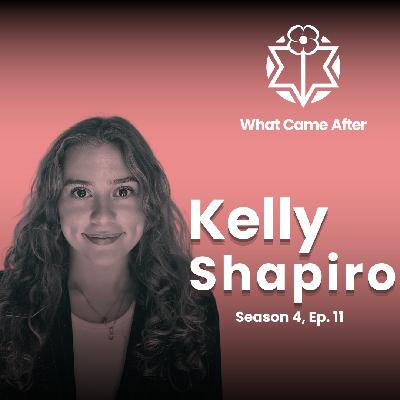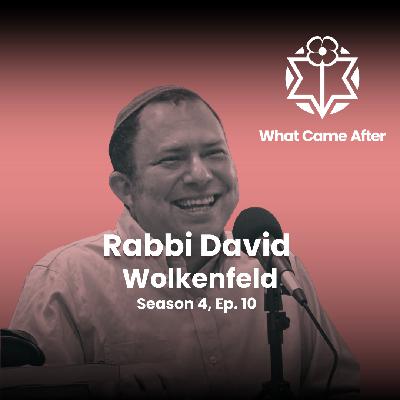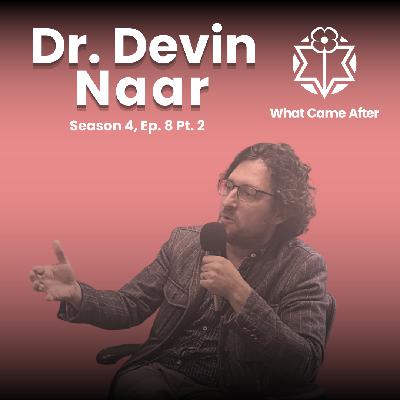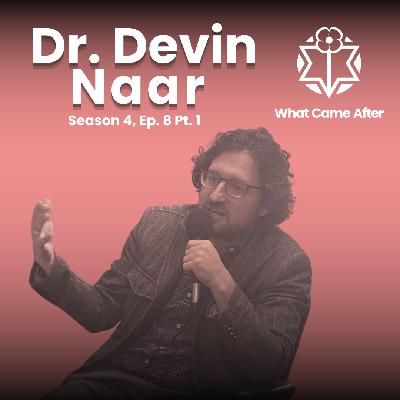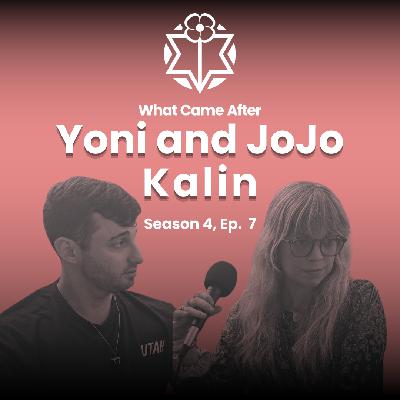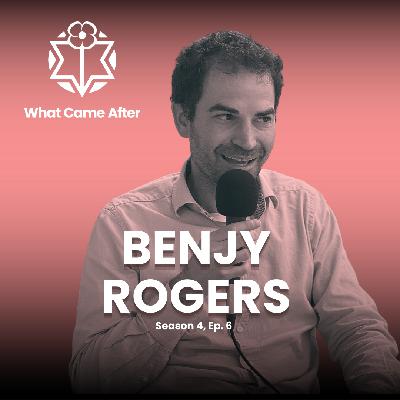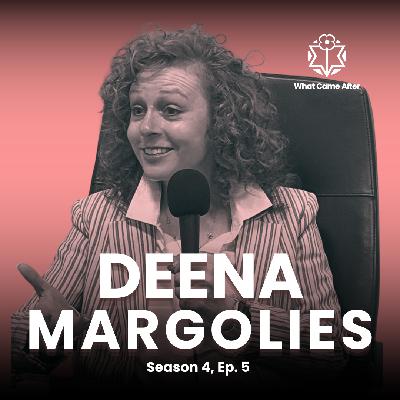Discover What Came After
What Came After

62 Episodes
Reverse
This past fall, I sat down with Nadine Greenfield-Binstock, a longtime Jewish communal professional who has devoted her career to strengthening Jewish life as well as Israel advocacy. After more than 20 years working with the American Jewish Committee, Nadine reflects on the AJC’s role in building bridges—both within the Jewish community and beyond it. She also speaks candidly speaks about the devastating night that Yaron Leschinsky and Sarah Milgrim were murdered at an AJC event in Washington, DC. Our conversation also looks ahead: the challenges facing emerging community leaders, as well as the many sources of faith in the Jewish future. Nadine shares the powerful story of her father, a survivor of nine concentration camps, and how he transformed post-traumatic stress into post-traumatic growth—along with her complicated feelings of relief that he did not live to witness October 7, as well as how much she misses him and wishes that he were here now to offer his hard-earned wisdom.
Credits:
Host and Creator: Manya Marcus
Managing Producer: Eli Akselrod
Editor and Producer: Ben Wallick
Editor 2: Eli Akselrod
Logo Design: Samuel Vilemar
Outro Music: פונאר” - סנדרה ג'ונסון”
Listen on Youtube
In September 2025, I sat down with Aryeh Schwartz, a professional photographer based in Washington, DC. Aryeh was working at the Capital Jewish Museum on the night that Sarah Milgrim and Yaron Leschinsky were murdered.
Aryeh is also the founder of Winsidr.com, a leading outlet for in-depth WNBA coverage.
In this conversation, Aryeh reflects on the night Sarah and Yaron were killed and its aftermath. He also reflects on the unexpected ways his work in WNBA journalism has shifted since October 7th. Aryeh speaks candidly about the many roles he holds beyond his professional life: as a father striving to protect his children while teaching them to cherish their Jewish identity; as a partner navigating difficult conversations with his wife about the balance between safety and Jewish pride; and as the proud brother of a combat soldier serving in th Israel Defense Forces.
This is a conversation about identity, responsibility and what it means to live as a Jew in America today.
Credits:
Host and Creator: Manya Marcus
Managing Producer: Eli Akselrod
Editor and Producer: Ben Wallick
Editor 2: Eli Akselrod
Logo Design: Samuel Vilemar
Outro Music: “שִׁירַת הָעֲשָׂבִים” - Rabbi Nachman of Breslov and Naomi Shemer
Listen on Spotify or Apple Music
Earlier this year, I traveled to Princeton, New Jersey to meet with Lynne Azarchi and Harlene Lichter Galen, authors of Countering Antisemitism: A How‑To Guide for Youth (8–18), Families and Educators. The two met while working on anti-bias programming in a New Jersey after-school setting and, during the height of COVID, began noticing a troubling rise in antisemitic bullying and bias targeting younger students.
In this episode, Lynne and Harlene reflect on their personal encounters with antisemitism and how their professional work with children across diverse backgrounds informed the book’s evidence-based approach. Central to their framework is the importance of helping children identify trustworthy adults who can support them in navigating antisemitism with confidence, compassion, and pride.
They also speak candidly about navigating political differences around Israel within their own families, and explain why the strategies outlined in the book remain effective regardless of political perspective. Both emphasize the urgency of beginning this work early—during elementary school—rather than expecting teens and young adults to face these challenges on their own once they reach college.
Credits:
Host and Creator: Manya Marcus
Managing Producer: Eli Akselrod
Editor and Producer: Ben Wallick
Editor 2: Eli Akselrod
Logo Design: Samuel Vilemar
Outro Music: “Where We Go” - Elijah Aaron
Listen on Spotify or Apple Music
Earlier this year, I sat down with Alissa Zeffren, a Tanach and History teacher at Ida Crown Jewish Academy outside Chicago and the director of NILI, the women’s division of the YU Torah Mitzion Kollel. Alissa also leads the Chicago chapter of Student to Student (STS), a program that trains Jewish teens—across Reform, Conservative, and Orthodox backgrounds—to present about Judaism in non-Jewish public and private school classrooms, working to combat antisemitism one classroom at a time. Our guest last week, Kelly Shapiro, is a notable graduate of Chicago's Student-to-Student program.
Alissa founded the Chicago STS chapter in direct response to the 2018 shooting at the Tree of Life Congregation in Pittsburgh. By the time October 7th occurred, the program was already well-established, with a robust network of schools and educators. Its peer-to-peer model—introducing students to the many facets of Jewish identity through direct conversation—had already seen great success.
In this episode, Alissa speaks with a rare blend of compassion and candor about what happened when STS students were scheduled to visit a public school in the days immediately following October 7th, and how she, her students, the STS program, and its partners navigated the unexpected challenges that followed.
Credits:
Host and Creator: Manya Marcus
Managing Producer: Eli Akselrod
Editor and Producer: Ben Wallick
Editor 2: Eli Akselrod
Logo Design: Samuel Vilemar
Outro Music: “Lmala” - Ilana Chava
Listen on Spotify or Apple Music
This past July, What Came After sat down with Kelly Shapiro, an engineering student at Rutgers University who founded the club Students Stand With Israel in the aftermath of October 7th. Kelly discusses her path into student government as antizionism and antisemitism surged on campus, and she reflects on the fear many Jewish students feel about speaking up—often out of concern that they lack an encyclopedic grasp of the conflict. She also shares her own experiences with intimidation since becoming the public face of her organization.
In our conversation, Kelly talks about both the burdens and the pride that come with taking on this work as a college student. She also describes how genuine dialogue—not protests or slogans—has helped foster unexpected moments of mutual understanding between her and some peers who identify as anti-Israel.
Credits:
Host and Creator: Manya Marcus
Managing Producer: Eli Akselrod
Editor and Producer: Ben Wallick
Editor 2: Eli Akselrod
Logo Design: Samuel Vilemar
Outro Music: “Light” - Ilana Chava
Listen on Spotify or Apple Music
This past September, What Came After traveled to Washington, D.C., to meet with Rabbi David Wolkenfeld, the rabbi of Ohev Shalom. Rabbi Wolkenfeld, who began his tenure only a few months before October 7th, reflected on the unique challenges of stepping into leadership in the shadow of that day.
He spoke about the wide range of pastoral needs that emerged within his new congregation—from helping people reclaim spaces for Jewish joy after tragedy to supporting families across multiple generations who hold very different perspectives on Israel. He also addressed the dangers of nationalism and how religious Zionism must grapple with what it means for God to have returned the Jewish people to a fully inhabited land, which is currently home to seven million Jews and seven million Arabs.
Credits:
Host and Creator: Manya Marcus
Managing Producer: Eli Akselrod
Editor and Producer: Ben Wallick
Editor 2: Eli Akselrod
Logo Design: Samuel Vilemar
Outro Music: “נועם בנאי - “עיניים טובות
Listen on Spotify or Apple Music
Earlier this week, I visited the Nova Exhibition in my hometown of Chicago. Even though I had visited the Nova site just four months after October 7th, I sensed that this experience would be more intense. I was right. And that intensity is part of what makes the exhibit so important.
After viewing the exhibit, I sat down with Doron Mizrahi. Doron, now 27, attended the Nova festival. He witnessed what he repeatedly describes as a “horror show”—a phrase that, as you’ll hear, is nothing if not an understatement. After saving several people and guiding them to safety, Doron went straight into the army reserves. Just three weeks after enduring the gruesome massacre, Doron was serving as a soldier in Gaza.
This episode is, in many ways, a love letter—to Doron’s family, especially his mother; to the army, which gave him purpose and belonging during his darkest hours; and to trance music. But perhaps most poignantly, this interview is a love letter to the Tribe of Nova, a deeply compassionate and organized community that has stepped in to support survivors on every level.
I know we have many listeners in Chicago and across the United States. I want to encourage everyone to see the Nova Exhibition—especially those who may feel scared or apprehensive. Every person who walks through the exhibit enters into a profound relationship with this moment in Jewish history. But they also become part of a surprising emerging narrative—one of courage, healing, and love.
I hope you enjoy this very special interview. And for those who are able to visit, you can find more information about the Nova Exhibition at novaexhibtion.com.
Credits:
Host and Creator: Manya Marcus
Managing Producer: Eli Akselrod
Editor and Producer: Ben Wallick
Editor 2: Eli Akselrod
Logo Design: Samuel Vilemar
Outro Music: “Run Away" - Bizarre Contact
Listen on Spotify or Apple Music
Visit us at https://www.whatcameafter.com/
Welcome back to What Came After. You’re about to hear the second part of my interview with Dr. Devin Naar, a professor of Sephardic Studies in Seattle.
When Devin and I first spoke a few months ago, we were trying to understand how to approach a set of topics about which we think and feel very differently. At one point, he asked me, “Where are you holding with the g-word?”—a question that, for most Jews since October 7th, needs no explanation.
For many Jews, the accusation of genocide against Israel is deeply offensive, even outlandish-- and profoundly antisemitic. For others, the idea of genocide in Gaza aligns with long-held critiques of Israel. And there are still other Jews who have identified—or still identify—as Zionists, for whom contemplating the possibility of a genocide has created real anguish and disorientation.
In this episode, Devin uses the g-word. I want to say explicitly that I do not agree with Devin's framing. But, as Dein and I discuss in this episode, I do believe very strongly in letting people speak for themselves. And I also see the critical importance of engaging honestly with Jews who see things differently, perhaps especially when the disagreements are substantive and painful.
Recently, when I told Devin that I had introduced him in the previous episode as a non-Zionist, he challenged that label. “Who said I was a non-Zionist?” he said. “I’m a Jew. A Sephardic Jew, full stop.”
Welcome back to this difficult conversation. No matter what you think of what Devin shares here, let's all hope for continued dialogue across our many Jewish communities—a future in which everyone gets to speak for themselves.
Credits:
Host and Creator: Manya Marcus
Managing Producer: Eli Akselrod
Editor and Producer: Ben Wallick
Editor 2: Eli Akselrod
Logo Design: Samuel Vilemar
Outro Music: “A Modern Man" - Guy Mendilow Ensemble
Listen on Spotify or Apple Music
Visit us at https://www.whatcameafter.com/
In this episode, I traveled to Seattle back in September to sit down with Dr. Devin Naar, a professor of Sephardic Studies at the University of Washington.
Recording this interview was difficult for me. I’ve envisioned this podcast as a way to chronicle history in real time — to capture, through long-form conversations, the vastness and intensity of the post–October 7th landscape for Jews around the world, and for many others as well.
Until now, the voices I’ve centered have largely been those of self-described Zionists — people who, in the wake of an indescribably cruel and harrowing attack on Israel, have faced a wave of vitriol, intolerance, hostility, and even violence.
But if this project is truly to document this moment in all its complexity, it also has to include non-Zionist voices — and we need to recognize explicitly that there is no single Jewish Community, but- as has always been the case-- Jewish CommunitieS. The word Israel in Hebrew- Yisrael-- means to wrestle. We usually think about this in reference to wrestling with God. But the truth is, we wrestle one another also.
I’m not interested in speaking with anyone who uses a non- or anti-Zionist stance as a rejection of dialogue — as a reason to hurl slogans, to deny the humanity or intelligence of people (like me) who are Zionists, or to justify acts of terror. But as we all navigate what I hope is a post-war reality, I believe that staying engaged — especially with those we perceive as the “Other” — is a skill that those of us who live in a multiplicity of Jewish communities will need to cultivate-- for our civility, for our integrity, and, in some ways, for our survival.
We’ve chosen to present this interview in two parts — exactly as it unfolded. At the end of this first installation, you’ll hear, as I did, that Devin seems unsettled, that there’s more he wants to say. After wrapping up, we turned the microphones back on and continued the conversation, which you’ll hear in part two.
This interview may be challenging to listen to — just as it was challenging for me to record. But I hope you’ll stay with it, and imagine what it might be like to have a similar conversation with someone, maybe someone close to you, who has provoked in you a sense of discomfort or distress or even betrayal over these past two long years.
Credits:
Host and Creator: Manya Marcus
Managing Producer: Eli Akselrod
Editor and Producer: Ben Wallick
Editor 2: Eli Akselrod
Logo Design: Samuel Vilemar
Outro Music: Syete dias enserrados by David Haim
Listen on Spotify or Apple Music
This past September, What Came After host Manya Marcus sat down with Jojo and Yoni Kalin, a married couple from Washington, D.C., who were present at the Capital Jewish Museum on the tragic evening of May 21, 2025 — the night two Israeli embassy staffers, Sarah Milgrim and Yaron Lischinsky, were murdered by a man who, when apprehended, shouted, “I did it for Palestine, I did it for Gaza.”
Jojo had helped organize the event that night — the American Jewish Committee’s annual Young Diplomats Reception. The theme was “Turning Pain into Purpose,” focusing on humanitarian diplomacy and efforts to build bridges amid the Israel–Hamas conflict. The murders that followed felt unbearably senseless and stood in stark contrast to the spirit of the evening.
In this conversation, Jojo and Yoni reflect on their experiences that night — including their brief, bewildering interactions with the attacker — and how they’ve processed the trauma since.
Jojo, who converted to Judaism, shares how this tragedy deepened her commitment to the Jewish faith and community, even as she wrestles with fears about raising future children in a tradition that can carry such risk. She also speaks about becoming a conversion mentor and her admiration for those choosing Judaism in the wake of October 7th.
Yoni, raised in a progressive Jewish home steeped in interfaith dialogue and activism, describes a growing sense of political homelessness after October 7th, and how he has grappled with what he calls the “hardening of [his] heart” since May 21st — as he comes to terms with the painful realization that, in America in 2025, being Jewish can come at a very steep cost.
Credits:
Host and Creator: Manya Marcus
Managing Producer: Eli Akselrod
Editor and Producer: Ben Wallick
Editor 2: Eli Akselrod
Logo Design: Samuel Vilemar
Outro Music: Noah · האילנות 41
Listen on Spotify or Apple Music
This past December, I sat down with Benjamin Rogers, Deputy Director of the AJC Center for a New Middle East. Benjy and I spoke about the future of Israel’s relationships with its Arab neighbors in the wake of October 7, and how he hoped the Abraham Accords will continue to evolve. Benjy discussed Israel’s potential as a strategic partner to countries across the region confronting shared challenges such as economic instability, water insecurity, and climate change. Despite ongoing tensions, Benjy remains hopeful that necessity will continue to drive progress toward normalization and regional collaboration.
He also reflected on the personal impact of tragedy—the May 2025 murders of Israeli Embassy staffers Sarah Milgrim and Yaron Lischinsky; Benjy felt particularly close with Yaron. Benjy speaks about the evening of the murder, how he and others are processing the senselessness of the tragedy, and how he continues to navigate what it means to live, work, and identify as a Jew in this complex moment in history.
Credits:
Host and Creator: Manya Marcus
Managing Producer: Eli Akselrod
Editor and Producer: Ben Wallick
Editor 2: Eli Akselrod
Logo Design: Samuel Vilemar
Outro Music: Olam Chesed Yibaneh · Rabbi Menachem Creditor · David Paskin
Listen on Spotify or Apple Music
This past September, I had the pleasure of traveling to New York City to sit down with Deena Margolies, a staff attorney at the Louis D. Brandeis Center for Human Rights Under Law. The Brandeis Center—unaffiliated with Brandeis University—provides legal advocacy for individuals affected by Title VI violations, with a particular focus on those targeted for their Jewish or Zionist identity in academic settings, from elementary schools to universities, including students, faculty, and staff.
In our conversation, Deena shares what inspired her journey from entertainment law to civil rights advocacy, where she now represents victims of antisemitism. She explains the scope of Title VI, unpacks the distinction between free speech and harassment, and recounts powerful stories of college students who risked their social standing to defend themselves and their peers. Deena also reflects on why her current work keeps her every bit as busy—and fulfilled—as her earlier legal career.
Please join me for this timely conversation.
Host and Creator: Manya Marcus
Managing Producer: Maya Zanger-Nadis
Editor and Producer: Ben Wallick
Logo Design: Samuel Vilemar
Outro Music: "Basheket Sheli" by Anat Malamud
Listen on Spotify or Apple Music
This past July, I had the privilege of sitting down with Yossi Held, Executive Director of Stand With Us Midwest. In our conversation, Yossi discussed the dual mission of Stand With Us: to educate the public about Israel and Judaism in order to counter widespread misinformation, and to provide legal support for individuals impacted by antisemitism—particularly in educational settings, from elementary schools to graduate programs.
Yossi reflects on how the small size of the Jewish community leaves it in a constant struggle to stay afloat against antisemitism—an undercurrent that has always existed but has now erupted into an undeniable force in society. He also talks about his personal journey through profound loss and resilience: navigating the aftermath of October 7th while caring for his terminally ill husband. Yossi shares how, in the midst of this storm of communal and personal adversity, his work at Stand With Us became his solace.
Host and Creator: Manya Marcus
Managing Producer: Maya Zanger-Nadis
Editor and Producer: Ben Wallick
Logo Design: Samuel Vilemar
Outro Music: "Boom Boom Blossom" by Elijah Aaron
Listen on Spotify or Apple Music
On September 17, 2025, Manya Marcus spoke with Raphael Herbst, a senior paramedic with Magen David Adom (MDA) and head of its Emotional Resilience Program, at the offices of American Friends of Magen David Adom in New York City.
Raphael discusses MDA’s vital role in Israeli society—from delivering world-class emergency care across the country to leading national responses to crises such as the COVID-19 pandemic, terror attacks, the 12-day war with Iran, and the October 7, 2023 massacre in southern Israel.
He also highlights MDA’s technological innovations, like using WhatsApp to guide patients before medics arrive and securing blood banks as strategic national assets. Raphael shares his personal journey, including his response to a 2001 terror attack and how it inspired his commitment to fostering emotional resilience among MDA staff through peer-to-peer support.
Host and Creator: Manya Marcus
Managing Producer: Maya Zanger-Nadis
Editor and Producer: Ben Wallick
Logo Design: Samuel Vilemar
Outro Music: "Oh My Soul" by Nuriel
Listen on Spotify or Apple Music
Welcome to What Came After. Today is October 22, 2025. While much remains uncertain in Israel, one thing is clear: the emotional recovery of an entire nation coping with collective trauma will be a long and complex process. In this episode, I speak with several remarkable people from Ripples of Healing, a therapeutic program that helps individuals process trauma through guided immersion in water. It’s a powerful, innovative and effective approach. We'll explore the therapy itself, as well as the personal journeys of several people who've been transformed by it.
---------
Yitzchak (Itzik) Rabinovitz
An electronic engineer and graduate of the University of Illinois, Itzik immigrated to Israel 47 years ago and has since devoted his career and life to strengthening Israel’s defense — both through his service in the IDF and his work in the defense industry.
He and his wife, Channa, are proud parents of five children and grandparents to 29. During Operation Iron Swords, four of Itzik’s sons and his son-in-law served on active reserve duty, each contributing over 400 days in defense of the nation.
-----------
Tzviki Barkai
Age 37, husband and father of two daughters.
During his military service in Gaza (Operation Cast Lead), Tzviki was shot in the head by a sniper and critically wounded.
After undergoing treatment at Einot Bar, he experienced a profound personal transformation and chose to dedicate his life to helping others heal.
Today, Tzviki serves as the CEO of Advot Marpeh (Ripples of Healing), a nonprofit organization operating within the Einot Bar ecosystem. He leads with deep commitment to expanding care and rehabilitation for trauma survivors.
-----------
Einat Sarfati Cohen
Founder of Einot Bar, Israel’s leading center for growth through crisis.
For the past decade, Einot Bar has been operating as an integrative healing center located in the heart of the Negev Desert, offering innovative programs that combine mind, body, and spirit.
Einat is a mother of three and the founder of the community of Giv’ot Bar, which became a model for sustainable living and regional development that transformed the Negev and the Galilee over the past twenty years.
Since October 7th, Einat has been working tirelessly in Israel and abroad to support soldiers and civilians recovering from trauma. The integrative medical model she developed at Einot Bar has been recognized as a leading approach in Israel for trauma recovery and holistic rehabilitation.
--------------
Host and Creator: Manya Marcus
Managing Producer: Maya Zanger-Nadis
Editor and Producer: Ben Wallick
Logo Design: Samuel Vilemar
Outro Music: "And The Waves" by Menachem Halevi and Nuriel
Listen on Spotify or Apple Music
Simon Deng is a former slave from South Sudan, human rights activist, public speaker, and professional swimmer. He has lived in the United States since 1989 and has been a leader of the South Sudanese expatriate community since 1993.
Host and Creator: Manya Marcus
Managing Producer: Maya Zanger-Nadis
Editor and Producer: Ben Wallick
Logo Design: Samuel Vilemar
Outro Music: "Jerusalem" by Elijah Aaron
Listen on Spotify or Apple Music
In February, What Came After sat down with the Chief Rabbi of Poland and native New Yorker, Michael Schudrich. Their conversation was recorded in Warsaw, where Rabbi Schudrich has lived and worked for the past 35 years.
Host Manya Marcus speaks with Schudrich about his personal journey to Poland, how there are many more Jews- or those with Jewish heritage- who live in Poland than anyone realized or expected when Schudrich took his post in 1990, and how Poland’s Jewish community is growing to include more Poles whose Jewish parents, grandparents and great grandparents stayed in Poland after the war and chose not to share with their own families that they were Jewish. Schudrich speaks to the process of self-discovery among these community members, as well as the need for the broader international Jewish community to recognize and support the Jewish life that has not only survived in Poland, but begun to thrive.
Schudrich talks about the Polish response to October 7th, and how, in the wake of the tragedy, more Polish Jews have come out of the woodwork and chosen to live Jewish lives.
Host and Creator: Manya Marcus
Managing Producer: Maya Zanger-Nadis
Editor and Producer: Ben Wallick
Logo Design: Samuel Vilemar
Outro Music: "It's Never Too Late" by Elijah Aaron
Listen on Spotify or Apple Music
Mino is a Roman entrepreneur and restaurateur with deep roots in the culinary world, shaped by his family’s experience in the industry. He manages two establishments: Casalino Osteria, a kosher restaurant, and a bakery-café, Dolce Kosher. Through his work, he combines tradition and innovation, creating welcoming spaces where people can enjoy great food and hospitality. Beyond the kitchen, Mino is passionate about curating special events and menus that highlight seasonal ingredients and Italian culinary heritage.
Host and Creator: Manya Marcus
Voice Acting: Matt Marcus
Managing Producer: Maya Zanger-Nadis
Editor and Producer: Ben Wallick
Logo Design: Samuel Vilemar
Outro Music: "Osim Shuk" by Noa (Achinoam Nini)
Listen on Spotify or Apple Music
Ruth Dureghello was born in Rome on July 5, 1967. She earned a law degree from the University of Rome La Sapienza and went on to pursue a career in entrepreneurial activities. Married with two children, Ruth led the “For Israel” party as its presidential candidate for the Council of the Jewish Community in Rome in 2015. She won 44.08% of the total vote and, following the Council’s recommendation, became the first woman to serve as President in the history of the Roman Jewish Community. Re-elected by a wide majority in 2019, she led the Jewish Community of Rome until June 2023.
Host and Creator: Manya Marcus
Managing Producer: Maya Zanger-Nadis
Editor and Producer: Ben Wallick
Logo Design: Samuel Vilemar
Outro Music: "Shir L'Shalom" by Lehakat HaNachal
Listen on Spotify or Apple Music
Listen to our conversation with ELNET CEE (Central and Eastern Europe) featuring:
Anna Miszewska, Deputy Director
Joanna Olszewska, Project Manager
Marta Kubica, CEO
Host and Creator: Manya Marcus
Managing Producer: Maya Zanger-Nadis
Editor and Producer: Ben Wallick
Logo Design: Samuel Vilemar
Outro Music: "Old Polish Tango in Hebrew" by Olga Mieleszczuk
Listen on YouTube






